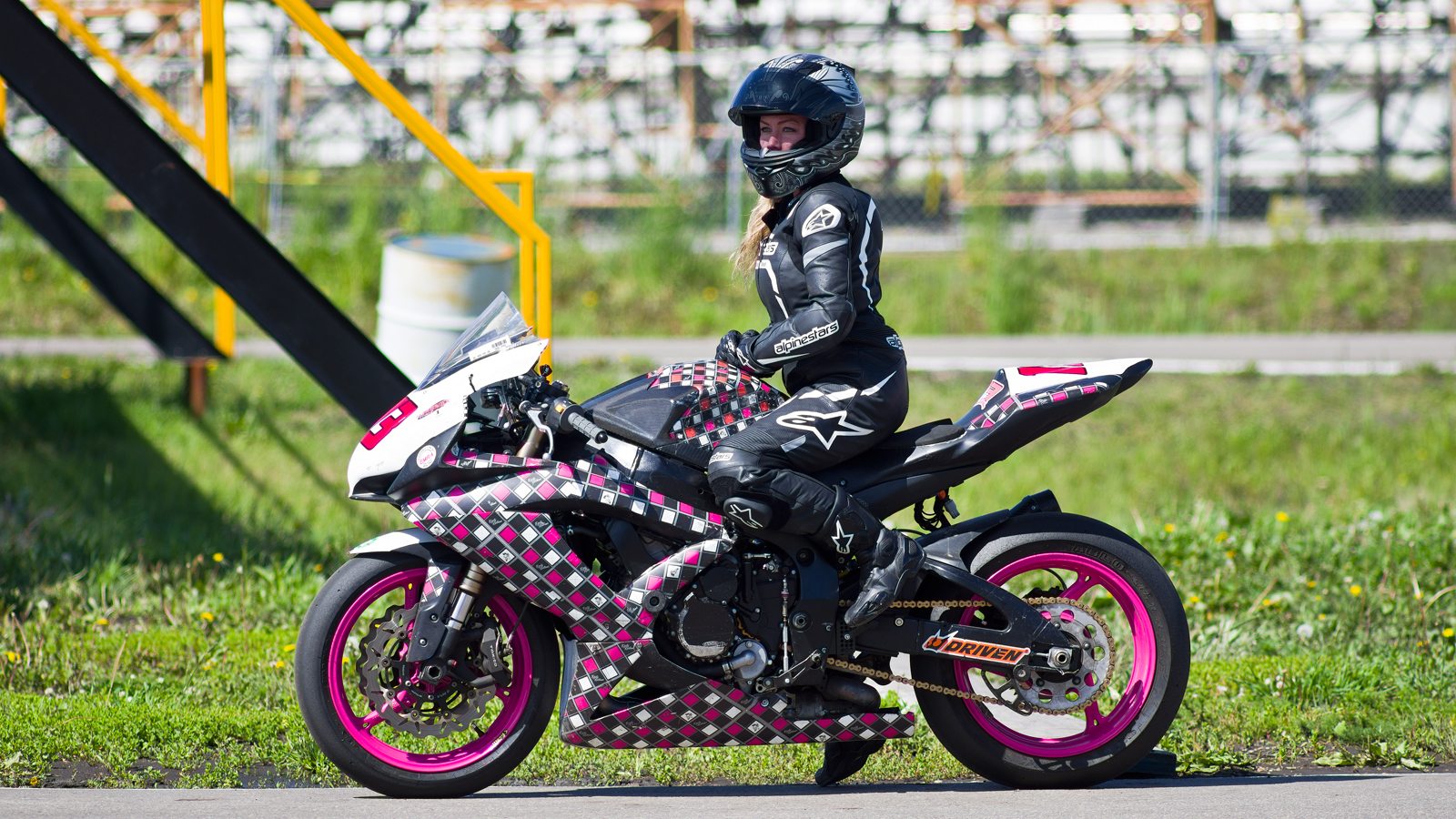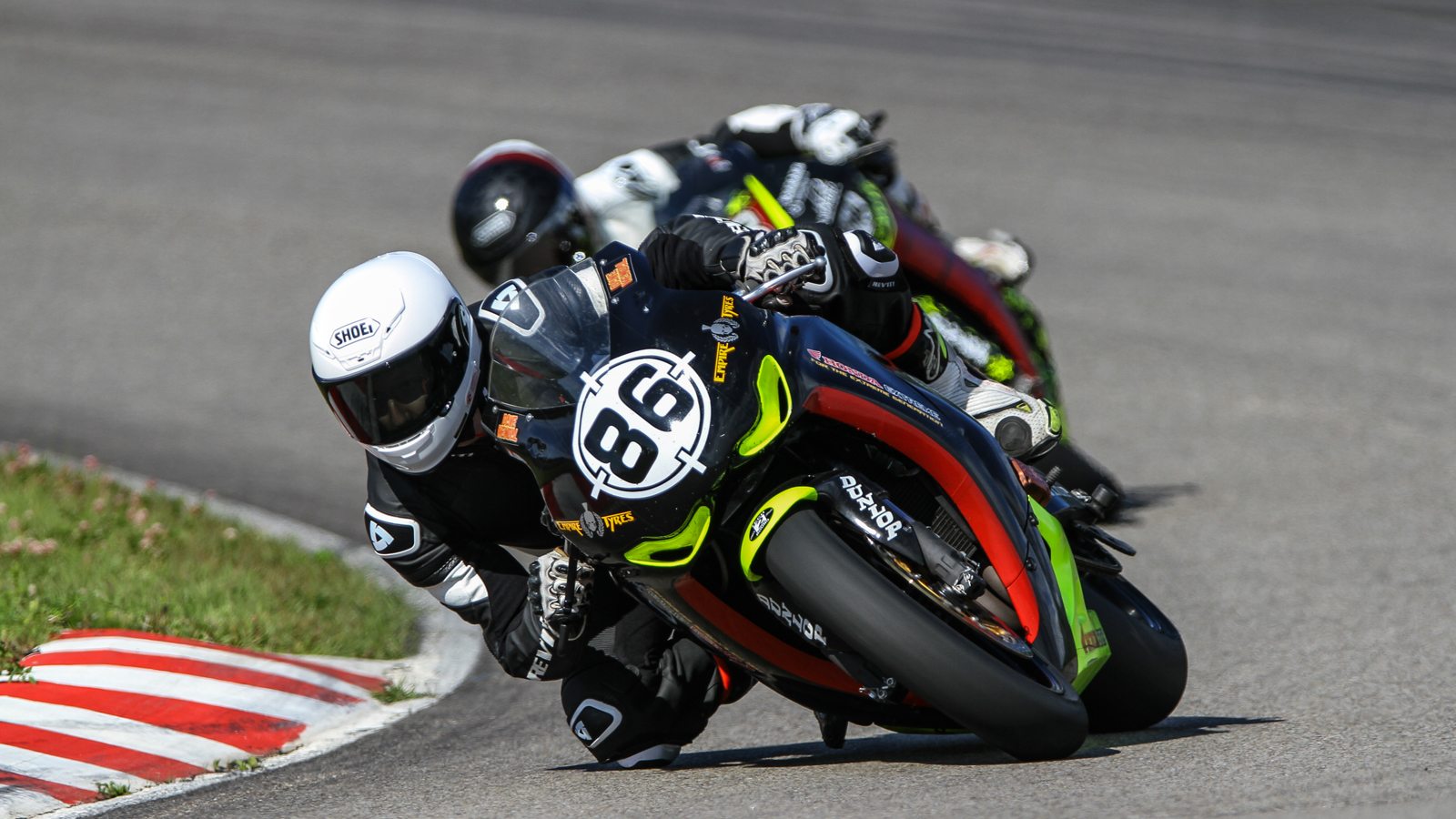Christina Mitchell’s most memorable moment as a motorcycle racer wasn’t winning a championship. In fact, it didn’t even occur on the track. It was when she returned to the pits after a particularly strong performance and saw the pride in her kids’ faces.
“As a parent, it’s usually the other way around,” says Mitchell, a mother of five from Beaumont. “I didn’t win but I put it all out there and was happy with what I accomplished. When I saw my girls beaming with pride for their mom, it was unlike anything I’d felt before. It was one of the most moving experiences of my life.”
Alberta has a vibrant motorcycle racing scene, largely due to the presence of Rad Torque Raceway, one of the few professional road courses in Western Canada. The 2.7-kilometre, 14-turn course, located just south of Edmonton, has hosted dozens of motorcycle races since 2014, complementing Rad Torque’s preexisting drag strip and dirt track.
Mitchell was drawn to the sport after getting swept up in the excitement of seeing her partner race. She started volunteering with the Edmonton Motorcycle Roadracing Association (EMRA), then borrowed a bike from another racer to try a track day (non-timed events where everyone rides at their own pace).
“For the first time in my life, I felt true freedom,” Mitchell recalls. “As a working mom and a wife, life gets complicated. But when I got on that track, it was just me and the bike. I remember thinking, ‘This must be what it’s like to fly.’”
Volunteering is also how David Kendal, President of the EMRA, got his start in the sport (the club compensates volunteers with track vouchers). He later attended a race-licencing school, followed by performance riding lessons to polish his skills—a roadmap that’s common among Alberta racers.
Ten years later, Kendal says the challenge is what keeps him riding competitively.
“One of the best parts of racing is what you learn about yourself—how you deal with nerves and respond to the pressure of competition,” says Kendal. “You feel a sense of community, realizing that everyone is just as nervous as you are rolling up to that Start line.”
Indeed, for racers like Beaumont’s Mitchell, part of the payoff of speed contests is what happens long after the throttle is closed and the tires have cooled.
“Some of the people I’ve met through racing I now count as my closest friends,” Mitchell says. “It’s a family and I can’t imagine my life without it.”
MORE TO READ
Discover the Badlands by bike: A weekend-long motorcycle trip to Drumheller
Kimberly Reeves, owner of Rad Torque Raceway, says the road course gives people a safe, controlled atmosphere to indulge their need for speed, along with first-class coaching and mentorship that’s important for any motorcycle rider—not just aspiring racers.
“Working with the EMRA and OnTrack Performance (Riding School), we’re trying to put more education and fun into the motorcycle community,” Reeves says. “You need training, you need safety equipment, and you need the proper venue. You would never have an NHL team practicing on a lake that’s half-frozen.”

GET SCHOOLED
Race school: To participate in EMRA races, a race licence must be obtained through an approved race school. There are currently two in Alberta: the EMRA Race School in May and the OnTrack Performance Race School in June.
Track days/nights: Non-timed events where riders of all levels can experience the race track at their own pace. Riders are grouped by skill and no race licence is required for the novice or intermediate groups. Hard Nox Track Dayz and the EMRA each host track days/nights at Rad Torque throughout the season (an EMRA membership is required for the latter’s events).
Riding school: OnTrack Performance offers riding lessons that help build speed and competency through instruction on proper cornering, body position, brake techniques and more. Note, however, that this is not a learn-to-ride school but rather a skills course for experienced riders looking to hone their technique on the track.
TIPS FOR BECOMING A RACER
• Watch an EMRA race event at Rad Torque Raceway
• Start doing track days/nights to get some seat time
• Enrol in a performance riding school taught by expert racers
• Take a race school and get licensed
• Volunteer during track days or race events
• Spend time in the pits helping a racer to get a feel for what’s involved
• Establish a race budget, accounting for race tires, spare bike parts, riding gear, race-entry fees, tire warmers, generator and more (race schools will provide you with guidance on this)
• Invest in quality safety gear, including a leather suit, riding boots that cover your ankles, and gauntlet-style gloves
• Race on a bike you’re willing to lose, as insurance won’t cover motorcycles damaged during a speed test, timed race or competition
• Check out EMRA’s YouTube videos of Alberta roadracing events
• Don’t ride above your skill level; be mindful of other racers and recognize that there will always be someone faster than you
• Have fun!
